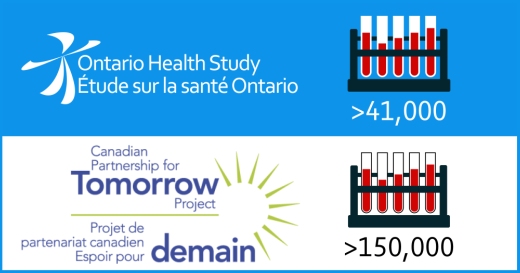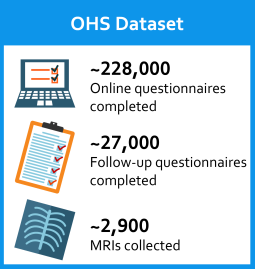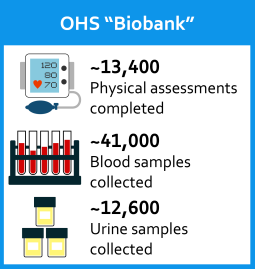The Ontario Health Study Newsletter, June 2017
Jun 14, 2017 // OHS Newsletter
In this issue:
- Study recruitment and blood collection come to successful finish!
- Fill out your follow-up questionnaire and provide an update on your health
- National project brings together data from population health studies across Canada
- We want to hear from you
Study recruitment and blood collection come to successful finish!
As you may know, March 31st, 2017 marked the end of the Study’s blood collection program and recruitment efforts. The final numbers are in and with over 225,000 Ontarians having completed the baseline questionnaire, the OHS is one of the largest health research studies in Canadian history. Our blood collection program finished with more than 41,000 samples, well above the 40,000 target. Other studies affiliated with the OHS have added other incredibly useful data such as more than 2,900 MRIs.
Celebrating Canada’s 150 by pushing the country’s largest biobank over 150,000
In addition to surpassing our goal, the OHS’ final drive for blood samples pushed the Canadian Partnership for Tomorrow Project’s (CPTP) biobank to over 150,000. CPTP is a national organization representing five regional cohorts, including the OHS.

So what’s next?
Your continued participation remains incredibly important. In the fall, the Study launched its first follow-up questionnaire. All eligible participants can access it by logging in to their OHS account and clicking on the red questionnaire banner.
With recruitment complete, the Study’s focus is now shifting to making our data available to researchers. We’ll keep you informed through this newsletter of any new projects using OHS data. You can also visit our website at www.ontariohealthstudy.ca to learn more about what we’re up to.
Large-scale research initiatives to use OHS holdings
Reza Moridi, Ontario’s Minister of Research, Innovation and Science recently announced funding for five of the Ontario Institute for Cancer Research’s Translational Research Initiatives. A number of these newly funded initiatives, including one focused on the treatment of acute leukemia patients, will make full use of OHS holdings.
Find out more about the Ontario Institute for Cancer Research’s Translational Research Initiatives.
What does the OHS dataset and biobank include?
Thanks to your generosity and commitment, the OHS can now make a rich dataset as well as a variety of biosamples available to researchers working on finding better ways to prevent, diagnose and treat cancer and chronic disease.
 |
 |
Update your contact info
We’ll be in touch with you regularly about Study activities, so please make sure that your contact information is up to date. To view or update your contact information, sign into your account, click “My Profile,” and then click “Personal Information.” Don’t forget to click “Apply” to save any changes.
Fill out your follow-up questionnaire and provide an update on your health
As you may know, the Ontario Health Study launched its first follow-up questionnaire in November 2016. Eligible participants have received an email inviting them to sign into their accounts to complete the questionnaire—and to date more than 27,000 of you have done so.
The follow-up questionnaire is your opportunity to provide the Study with an update on your health and is critical to the success of long-term population-based studies like the OHS. Researchers will use this health information to study how our lifestyle, environment and family history affect our health over time and to develop strategies for the prevention, early detection and treatment of diseases.
Login to your OHS account to access the questionnaire. You’ll find that some of the questions are similar to those in the first questionnaire you completed but there are also additional questions focused on mental health, eCigarette and marijuana use, and over-the-counter drugs. It will take about thirty minutes to complete—and the more questionnaires completed, the more information that is available for future research.
Watch this video to find out more about how data from the follow-up questionnaire may be used.
National project brings together data from population health studies across Canada
Did you know that by participating in the Ontario Health Study (OHS) you are contributing to Canada’s largest population health study, the Canadian Partnership for Tomorrow Project (CPTP)? CPTP is a partnership of regional studies like the Ontario Health Study (OHS), including: the OHS; BC Generations Project; Alberta’s Tomorrow Project; Quebec’s CARTaGENE and the Atlantic PATH.
The project means that researchers will benefit from a larger and more varied dataset and biobank. Together, the regional studies have recruited more than 300,000 volunteer participants from across Canada. Like you, participants from the other studies completed a questionnaire process and were invited to provide a blood sample. In our recent final push for blood samples, the OHS helped build the CPTP biobank to more than 150,000 samples.
The National Post recently ran a series of articles on the CPTP, looking at the perspectives of both researchers and CPTP participants, as well as the potential for new discoveries resulting from this national collaboration.
Read the National Post series on the Canadian Partnership for Tomorrow Project.
We want to hear from you
As the Study continues, we want to know what types of updates and information you would like to receive from us. Whether it’s learning more about our team, new research projects using participant data, non-OHS news from the chronic disease research community or something else tell us what you’d be interested in reading.
We not only want to know what you’re interested in, we’re also wondering how you would like to receive the information we share. Do you prefer an e-newsletter in your Inbox? Or to follow us on Facebook and get the information as it becomes available? Perhaps you’re interested in getting this information directly from the home page of your OHS account. Are there other ways you like to receive information?
Send your suggestions to communications@ontariohealthstudy.ca with the subject line “OHS Feedback” to help shape and improve your OHS experience.
